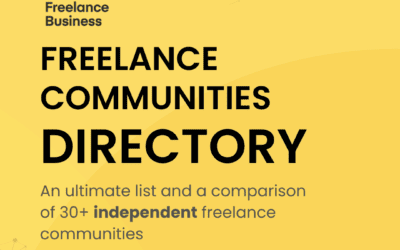We’ve already looked at the advantages of freelancing, and explained why people might prefer it over a 9 to 5 job. Making the switch to this new career path can seem frightening, but you’re not alone – from legal help and pricing to vacations, there is an ocean of resources online to guide you. And the biggest question usually is: where to get my first client?
Our very own Bozhidar Ivanov got his first gig thanks to volunteering in an international project Open Sofia in Bulgaria (even though he lives in the UK), and Anastasiia Dehtiarova signed a client at the first Freelance Business Day back in 2018. How do you find clients? Share it with the community on LinkedIn!
1. Word of Mouth
When buying a new gadget, do you trust your friends’ recommendations or the brand’s advertising? The same goes for freelancing: a personal recommendation is stronger than the flashiest CV. Why? Because people trust what they know – having social proof of someone’s skills means a lower risk of hiring the wrong person. If you’ve made a good impression in the past you’re already way ahead of the highest-rated online freelancer. Joining small networks of freelancers is another way to find help and support. You can see our Slack channel for a taste! Being a freelancer means learning to push yourself forward. Make sure every neighbor parent knows you’re an awesome illustrator for children’s books or your manager friends know that you’re the most attentive virtual assistant. You’re an entrepreneur now, solve other people’s problems!
2. Volunteer
Yes, this may sound counterintuitive, but doing some work for free is a great way to get your foot in the door. Most small organizations are unlikely to refuse free help, and it is a great chance to showcase your skills and find networking opportunities. If you do an excellent job or reveal an unexpected source of value, you can negotiate some paid work. Just be aware of companies trying to exploit your work – know your worth and where to draw the line. Freelance Business has some internship positions available.
3. Go local
Even if you live in a small city, you can find many organizations looking for support – most even take pride in working with local professionals. Keep an eye out for projects and opportunities available in your area. Monitor local events. During Covid, most of them are likely to be online, which will make it easier to attend. Don’t hesitate to join a coworking space: they aim to create their own small community and are usually full of ambitious people who are doing exciting things and looking for new people. You can watch Christine Vanhove’s advice on simple marketing and useful tips on networking and connecting with new people. A good resource is local Facebook groups or online communities. If you’re based in Belgium, here is the list of the latter to get you started, plus that of freelance organizations by country. Look for events to promote, websites to develop, local bands to produce – remember people around you are always making things – find out how you can help them.
4. Create content
Positioning yourself as an expert will give potential clients more confidence in working with you. Showing you are invested in your field and that you have knowledge worth sharing will add a layer of professionalism to your portfolio, and show you are not doing it just because it pays the bills. You can write an eBook, create a video series, or a podcast, or create a short course teaching the skills you have to eventually position yourself as a thought leader. It takes a time investment, but it will be worth it in the end!
5. Linkedin (and other social platforms)
3 people are hired through LinkedIn every minute, so it is a good idea to have a presence there and keep an eye out for opportunities. The secret to successful networking on Linkedin is: to be active! Talk with people, comment on their posts, share stories and experiences, and compliment others’ work. If they have interest, your profile will show them what you offer, examples of previous work, and your experience. Other platforms include Instagram for photographers and visual artists, GitHub for programmers and developers, Youtube for videographers, as well as Facebook groups, like Remote Work & Jobs for Digital Nomads and Get Projects. Find where your professional circle is online, and be there!
6. Freelance Boards
The first stop for most freelancers, the various job boards like Upwork and Freelancer offer hundreds of positions for any freelancing discipline. It’s often the first place clients visit too, and a deal can be done quickly, as you both know what you’re looking for. Some freelance boards are aimed at a specific niche, such as Creative Guild for creatives, Codeable for WordPress developers, WeWorkRemotely for remote work, and Angel for startup jobs and projects. The downside is that it can be challenging to stand out from the competition, especially if you’re a young professional without much experience, as there are many people competing for the same jobs. However, it is always worth having a presence on the platforms. If you’re looking for the best ones to get started on, we have a few suggestions, and if you want to learn how to make the most out of such platforms, Andrew Barnes and Zachary Kilhoffer offer some valuable advice.
7. Cold Email
When all else fails, getting in touch with organizations directly can be worth a try. The best advice here is to target small to medium companies which can realistically be interested in working with you. Always try to send the email to an actual person, instead of the generic ‘contact’ email. Keep it short and to the point, and brace for a healthy amount of ignoring and rejection.
8. Be Creative!
These are just a handful of ways to find your first client. What they all have in common is that you need to be proactive! Speak to that person, sign up for that event, ring that number. Once you get the ball rolling, you’ll see what works best for you and will find future clients easier. Freelancing is not like a treasure map: you need to explore your own way and see what treasure it brings you.




